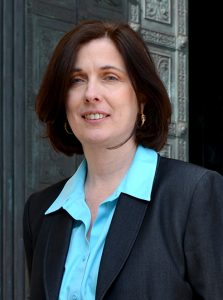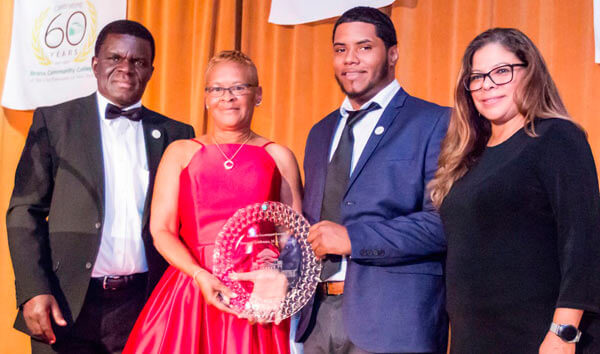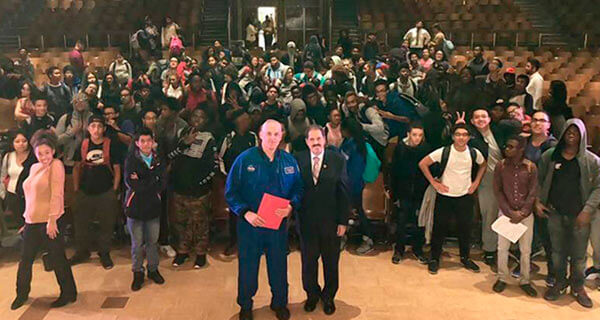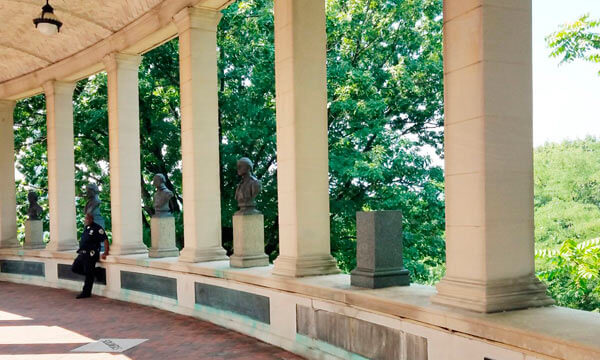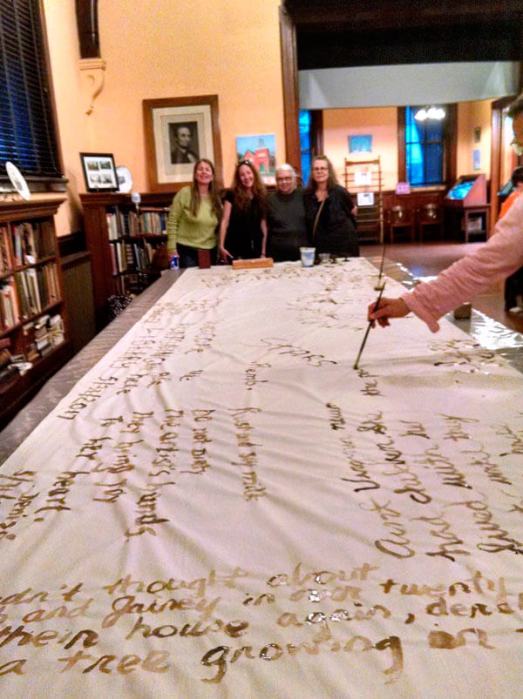A Bronx Community College administrator stepped down from her role on Wednesday, the day before campus leaders planned to call for her removal.
Bronx Community College (BCC) President Thomas Isekenegbe announced Wednesday that Kay Ellis, vice president of administration and finance, resigned from her position, effective Dec. 31, in an email obtained by the Bronx Times.
“Kay has served our college for nearly seven years and has overseen major projects and campus improvements here at BCC,” Isekenegbe said in the email. “Please join me in wishing Kay well as she moved on to retirement.”
Kay, who began her role in January 2016 overseeing business operations, human resources, technology, infrastructure, facilities, financial management, health and safety, security, administrative support and campus services, isn’t leaving on a positive note, however.
When the news of her resignation surfaced, the BCC College Senate, which consists of student government, faculty and administrative representatives, was already set to vote the following day on a resolution that threatens a vote of no confidence in Isekenegbe if various demands aren’t met by Feb. 7. The resolution, which called for Ellis’ removal, passed on Thursday 47-7 with one abstention.
Isekenegbe asked the Senate to get rid of the demand for Ellis’ removal from the resolution, but there weren’t enough votes to do so. Even though her resignation was ultimately announced the day before the vote, the clause was a symbol of accountability, Senate Chair Roni Ben-Nun told the Bronx Times.
Support for the resolution stretched beyond the 60-member body, with endorsements from 14 college departments and the BCC Council of Chairs.
The resolution stated the goals of the college are undermined by mismanagement and a lack of accountability with an ongoing neglect of infrastructure and facilities paired with poor management from Ellis, pointing to flooding in Colston Hall in the spring of 2019 and the struggle to heat campus buildings this fall.
It’s not the first time faculty leaders showed dissatisfaction with Ellis, as the Faculty Council held a vote of no confidence against her 23-3 with three abstentions in November 2019.
The 2019 resolution stated that she had shown “a failure of oversight and forethought in the execution of her duties, leading to a widespread lowering of morale amongst the faculty and staff at Bronx Community College.” The resolution cited issues with her communicating “properly and openly,” as well as a lack of transparency in budgetary reporting and budgetary mismanagement. It also called her “attitude and treatment of staff and faculty” unacceptable and said dozens of staff members she oversaw left the college.
As for whether these issues have persisted: “Pretty much,” Ben-Nun said.
E-mails to Ellis from the Bronx Times were not returned and calls to her office were unsuccessful.
That 2019 resolution also alleges that she dismissed a request for mold testing after the flooding of Colston Hall by saying the school is in the Bronx, and at another point told a faculty member to wear a sweater in response to concerns about cold temperatures in offices and classrooms, a battle the campus community has continued to face this year.
The campus didn’t have heat as New Yorkers prepared for winter, forcing the administration to shift classes online temporarily after roadblocks in getting an obsolete and damaged system running.
Bronx Community College shifts to remote learning in struggle to keep heat on
Classes returned to in-person after Thanksgiving break on Nov. 28. All three of the college’s boilers are now functioning, and the heat is working, according to BCC spokesperson Richard Ginsberg.
“We don’t anticipate having any additional heating issues, and a back-up boiler has been deployed to the campus,” he added.
That being said, sources told the Bronx Times that some buildings still faced heating issues after the return to in-person classes.
Ben-Nun said classrooms that were still cold after Thanksgiving break were addressed, and efforts are now focused on regulating the system, which can also run too hot — a problem he said has been long-standing.
“It’s like we either can freeze you, or boil you, but that’s not right,” he said.
Isekenegbe said at the Senate meeting Thursday that staff is working building by building to identify the heat-related issues and resolve them accordingly.
Thursday’s resolution also called on Isekenegbe to report on the condition of all buildings and develop various policies and plans to address issues ranging from bathroom cleanliness to college retention. It also called on him to collaborate with the Senate to improve campus culture.
Bronx Community College is one of three public City University of New York schools in the Bronx, along with Hostos Community College and Lehman College.
Also on Thursday, a rally was held at Hostos Community College by student leaders and members of the Professional Staff Congress union, which represents 30,000 CUNY employees. They called on Gov. Kathy Hochul to increase state funding for the city’s public college system by $350 million for four-year undergraduate programs and $78 million for community colleges in her next Executive Budget, and asked city leaders to oppose a 3% city budget cut to CUNY.
“After years of public disinvestment, CUNY colleges are vastly underfunded, facing staffing shortages, uncompetitive salaries and crumbling buildings,” the union said in a statement.
Mayor Eric Adams’ budget director Jacques Jiha sent a memo to every city agency in September telling them to plan for 3% cuts for Fiscal Year 2023 and 4.75% for each of the following three years. Adams’ administration anticipates that budget cuts made through its November Financial Plan will save the city $2.5 billion over Fiscal Years 2023 and 2024.
The union in April praised New York state’s FY 2023 budget for the largest year-over-year CUNY state funding increase in decades, but said four-year undergraduate programs will still have funding per student below 2009 levels.
This article was updated at 12:44 p.m. on Dec. 12 to include the request of $78 million for community colleges
Reach Aliya Schneider at aschneider@schnepsmedia.com or (718) 260-4597. For more coverage, follow us on Twitter, Facebook and Instagram @bronxtimes

